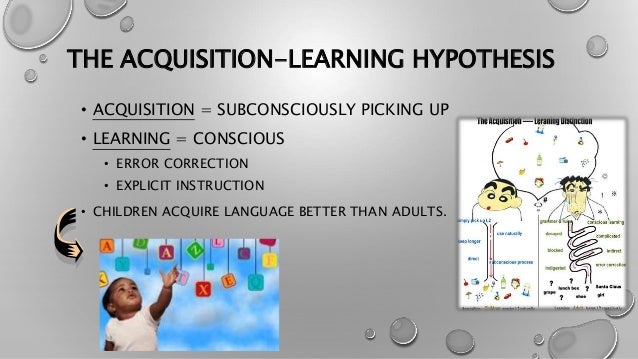What is the acquisition learning hypothesis? It states that there are two independent ways in which we develop our linguistic skills: acquisition and learning. One method is learning, a conscious study of the forms of language.
Comprehensible input is best received when the learner is hearing something that he or she wants or needs to know. We are generally not consciously aware of the rules of the languages we have acquired.
Instea we have a ‘feel’ for the correctness. Krashen Terrell. Inversely, a lack of comprehensible input delays language acquisition.
This hypothesis actually fuses two fundamental theories of how individuals learn languages. When a person monitors.

This may lead us to believe that the first hypothesis itself - that of the distinction between learning and acquisition - is an. Output leads to output. Acquiring language is a “subconscious process identical in all important ways to the process children utilize in acquiring their first language.
Acquisition -based teaching with meaningful comprehensible input. Focuses on communication, not accuracy of form. Emphasize acquisition over learning.
Focus on acquisition -based activities: input above output. Jenna Burnside 0views. Second-language acquisition (SLA), second-language learning, or L(language 2) acquisition, is the process that helps a learner to acquire a second language. Monitor Hypothesis : Types of Users.
Language is a cognition that truly makes us human. Whereas other species do communicate with an innate ability to produce a limited number of meaningful vocalizations (e.g. bonobos), or even with partially learned systems (e.g. bird songs), there is no other species known to date that can express infinite ideas (sentences) with a limited set of symbols (speech sounds and words). A rival hypothesis about learning comes from the work of Anderson, and other cognitive scientists.
Learners begin to understand a language by listening in an immersive environment. Only once a learner has had enough exposure to the language can they begin to speak it. However, as critics reveal through deeper investigation of the acquisition - learning distinction, to separate language learning clearly and adequately from language acquisition is impossible.

The person behind The Learning Hypothesis. According to the CPH, there is a finite period during which it is possible to acquire a language flawlessly. Well you will learn strategies and find resources to help you create an enthusiastic experience like you always planned. So, the Input hypothesis is only concerned with ‘acquisition’, not ‘learning’.

Sounds a lot like the perfect model of developing expert performance in soccer. Learning is a conscious process that focuses on the structure of the language.
Contrary to it, acquisition is a process which represents the subconscious activity by which new language is internalized and this process emphasizes on the meaning rather than on the structure. His language learning was examined longitudinally for a ten month period. The hypothesis claims that there is an ideal time window to acquire language in a linguistically rich environment, after which further language acquisition becomes much more difficult and effortful.
The critical period hypothesis states that the first few years of life is the crucial time in which an individual can acquire a first language if presented with adequate stimuli. ACQUISITION LEARNING No two students have the same schema, nor do they learn the same way! Which one of the scholar does support language acquisition and learning hypothesis ? Acquired system, where language is acquired subconsciously.
Some recent teaching methodologies have recognised the important role played by the setting of learning, and by the quality of interactions therein. One possible implication of this hypothesis is that teaching language through a traditional structural syllabus may not necessarily help them to acquire the language they need.
Hiç yorum yok:
Yorum Gönder
Not: Yalnızca bu blogun üyesi yorum gönderebilir.